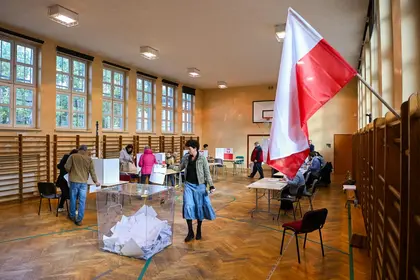Poles began voting on Sunday, Oct. 15, in parliamentary elections that will prove crucial for future ties with the European Union and neighbouring Ukraine, as the ruling populists bid for a third consecutive term in power.
Opinion polls indicate the nationalist Law and Justice (PiS) party will get the most votes but may struggle to build a governing coalition, giving a chance to the opposition led by former EU chief Donald Tusk.
JOIN US ON TELEGRAM
Follow our coverage of the war on the @Kyivpost_official.
Polling stations across the EU and NATO member opened at 0500 GMT and will close at 1900 GMT, with exit polls expected immediately after and final results on Monday.
Some 29 million people are eligible to vote, including half a million registered abroad in a large diaspora.
A PiS victory could exacerbate tensions with the EU and Ukraine and will dismay campaigners concerned about the future of media freedoms, women's and migrants' rights.
"We are in the EU, and we want to stay there, but in an EU of sovereign countries," PiS leader Jaroslaw Kaczynski said at the party's last major rally in Sandomierz on Friday.
At his own final rally, Tusk told supporters in Pruszkow that PiS had "secret plans" to leave the EU and said they were "leading the country down the wrong path".
"This is the most important day in the history of our democracy since 1989," Tusk said at the rally.
"We will also be voting for Poland to remain in the European Union. Poland is the heart of Europe," he added.

Ukraine and Poland’s Leaders Discuss ‘Real’ Security Guarantees
- Opposition hopes for upset -
PiS has vowed to press ahead with controversial reforms of the judiciary which it says are aimed at rooting out corruption but which the EU sees as undermining democracy.
The row has blocked billions of euros in EU funding.
The most likely coalition partner for PiS would be Confederation, a far-right party that has called for an end to Poland's large-scale assistance for Ukraine and has campaigned on a strongly anti-migrant platform.
But Confederation has publicly ruled out such an alliance and some analysts say it is unlikely to happen because of simmering tensions between the two parties.
The hope among liberals is that, even if Tusk's Civic Coalition comes second, it will have enough votes to form a government with two smaller potential allies.
The elections are for the lower and upper houses of parliament and PiS has organised a referendum on the same day with leading questions on migrants and the economy, which the opposition has called for people to boycott.
Supporters of PiS say victory on Sunday will allow the party to fulfil its vision of a strong, sovereign Poland based on traditional Catholic values.
The campaign has been characterised by personal attacks on Tusk by the ruling party, which has accused him of working in the interests of Germany, Russia and the EU.
PiS has also ramped up anti-migrant rhetoric, with Prime Minister Mateusz Morawiecki saying the country should be protected against illegal immigrants "who have no respect for our culture".
- 'Want a better Poland' -
Many voters are exasperated by the divisive, bitter tone of the campaign and polarised political scene.
"I want a better Poland than the one we have now. I want my children to live in a free, democratic and smiling country," said Beata Myszkiewicz, a self-employed 53-year-old.
"I don't want people glowering at each other because their political opinions differ. I think these are the most important elections and everyone should go and vote," she said.
Ukraine and its Western supporters are also watching warily in case Poland follows Slovakia, which last month elected a government that promises to take a much more sceptical view on sending aid to Ukraine.
Poland has been a leading cheerleader for Ukraine in the EU and NATO and has taken in a million Ukrainian refugees, but there is growing fatigue among many Poles.
The government has also fallen out with Ukraine over a grain import ban aimed at protecting Polish farmers.
Marcin Zaborowski, an expert at the Globsec think tank, said the ruling party has adopted a chillier stance towards Ukraine in a bid for nationalist votes.
"After the elections, it may be too late to go back on this since the damage will have been done," he said.
You can also highlight the text and press Ctrl + Enter










